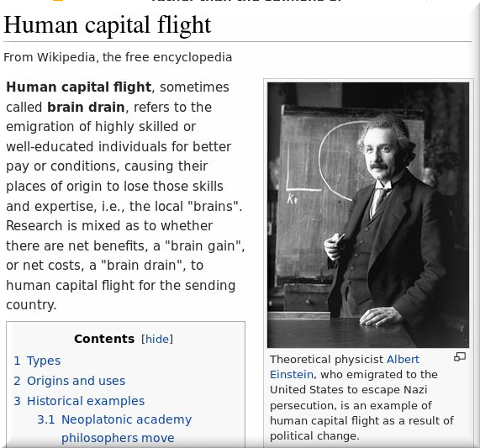
 Reference (Wikipedia): Human capital flight
Reference (Wikipedia): Human capital flight
THE American patent system (especially the courts) seems to have improved in the sense that it becomes a lot stricter; patents on software, for example, are harder to get/enforce in the US, but the system in Europe is all backwards. The European Patent Office (EPO) changed a lot -- obviously for the worse -- after 8 years of Battistelli; we aren't even talking about all the abuses and corruption but about purely technical things. Examiners and stakeholders both complain -- something that has not happened at any moment in history. The EPO makes the US Patent and Trademark Office (USPTO) look like a model organisation.
"The EPO makes the US Patent and Trademark Office (USPTO) look like a model organisation."The year is about to end and we want to minimise writing while we migrate to another datacentre (data synchronisation being of concern); but before Christmas kicks in (marking about a month since SUEPO last said anything) let's quickly look at what the patent trolls' lobby wrote some days ago. Adam Houldsworth, promoter of patents on life, spoke about the EPO's opening to patents on life again:
EPO announcement signals prohibited plant patents may be back on the cards – The EPO’s Technical Board of Appeal stated that a recently adopted rule of not granting rights for plants produced exclusively by an essentially biological process contradicts the European Patent Convention, suggesting that the office will now begin to grant patents for such inventions again. Following years of uncertainty about the patentability of the products of essentially biological processes under Article 53(b) of the EPC, the EPO Administrative Council provided clarification in 2017 by amending the Implementing Regulations to include Rule 28(2): “Under Article 53(b) European patents shall not be granted in respect of plants or animals exclusively obtained by means of an essentially biological process.” However, in early December the Technical Board of Appeal issued a notice saying that: “At the oral proceedings, which took place on 5 December 2018, Technical Board of Appeal 3304, in an enlarged composition consisting of three technically and two legally qualified members, held that Rule 28(2) EPC (see OJ 2017, A56) is in conflict with Article 53(b) EPC as interpreted by the Enlarged Board of Appeal in decisions G 2/12 and G 2/13. The Board referred to Article 164(2) EPC, according to which the provisions of the Convention prevail in case of conflict with the Implementing Regulations, and decided to set the decision under appeal aside and to remit the case to the examining division for further prosecution.”
Programs for computers and mathematical methods as such are excluded from patentability; however, it is possible to patent the so-called “computer-implemented inventions” (CII), i.e. the inventions that have features realized wholly or in part by means of a computer program and which provide a technical effect.
Therefore core-AI, e.g. the algorithm as such, is not patentable, whereas only AI-related inventions which have a technical character are eligible for patent protection.
The European Patent Office has recently issued guidelines on the patentability of AI-related inventions, moving from the discussions carried out during the EPO conference on “Patenting Artificial Intelligence” held on May 30, 2018.